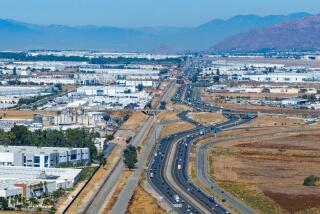Land Prices Force Churches to Gather in Warehouses : Thousand Oaks: A broker says congregations can expect to pay between $690,000 and $1.7 million for an undeveloped acre.
- Share via
No church bells ring for the members of Calvary Community Church in Thousand Oaks when they arrive for Sunday services.
The outside of the church looks much like the nearby discount shoe store except for the signs adorning the large warehouse that the congregation calls home.
“We don’t have organs or bells or stained glass,” said Larry DeWitt, Calvary’s pastor. “People have difficulty finding it because they don’t expect to find a church in an industrial park.”
The congregation is one of half a dozen that have abandoned stained glass and high steeples for the more Spartan warehouses that the city has to offer, a trend inspired partly by high real estate prices.
Zoning laws have been another factor, pitting churches against fiercely protective residential neighborhoods opposed to the traffic that Sunday services bring.
The Calvary Community Church has avoided parking difficulties partly because surrounding businesses do not open on weekends.
“We shook hands and made a deal. We’re not open on Sunday, and they’re not open on Saturday,” said John Earnest, owner of the California Shoe Center behind the Calvary church. “The only time we’ve had a problem is when they have a wedding and we have a major sale.”
Although Calvary church has owned a 35-acre parcel at the junction of the Moorpark and Ventura freeways for 10 years, it is unlikely that the church will move out of its 40,000-square-foot warehouse in the near future.
Bob Feitl, Calvary’s financial administrator, said the church has not raised money to build on the land. A sign announcing the church’s future home has been on the parcel for years.
Cheryl Richmond, a commercial broker at Brown Realty, said the churches that have had to seek warehouse space are young, independent congregations that have no financial backing from a larger denomination.
“They have to have a credit history. They have to have a financial statement. And most of these churches don’t have that,” Richmond said. “They’re taking in a certain amount of money, and they’re spending that money too.”
In Thousand Oaks, churches can expect to pay between $690,000 and $1.7 million an acre for undeveloped land, depending on the location, she said. Some congregations rent schools and hotels while waiting to move into warehouses.
Victory Christian Church has been turned down three times in the past few months by landlords unwilling to rent space for less than three years, said Pastor Mark Goeser.
So while waiting for a warehouse, Goeser leads members of the Victory Christian Church at services held in the banquet room of a Howard Johnson hotel in Thousand Oaks. On some Sunday mornings, hotel guests drop by and attend the service.
“My greatest concern is not that it has a steeple on top of it, but if it can minister to the needs of the people,” he said.
John Greenlee, pastor of the Westlake Community Christian Church, leads his flock in an auditorium at Westlake Elementary School. Greenlee said it will be years before his flock raises enough money to begin thinking of building.
“You’re talking about the collection plate that’s passed around on Sunday mornings,” he said. “You’re not talking about corporate dollars.”
In many ways, Thousand Oaks’ strict zoning regulations have forced churches into industrial zones, said Ellen Briggs, an assistant city planner.
To open a religious center, churches must be granted a special permit from the city. The city requires churches to set aside enough land for the worship area and for additional parking if they operate day-care centers or schools.
Usually one parking space is needed for every four seats in a church. If a church has 500 members, it needs 125 parking spaces.
In recent years, residents have begun to oppose churches because they clog neighborhood streets on weekends, Briggs said.
“They don’t want a lot of cars parked on the streets, that’s the basic reason,” she said. “Churches make out a lot better if they’re entirely surrounded by an industrial area.”
Muslims as well as Christians are worshiping in warehouses, said Iqbal Kidwai, a spokesman for the Islamic Center of the Conejo Valley.
A group of Thousand Oaks Muslims has been meeting in a warehouse on Lavery Court for more than a year, but has never collected enough money to build.
“We’re paying for seven days, and we only use it five hours a week,” Kidwai said.
Worshipers donate the $1,400 monthly rent for a small warehouse that has been converted into a mosque for Friday afternoon services. Prayer rugs cover the old carpet, and festive signs adorn the white walls.
The street on which the Islamic center sits is also occupied by two other warehouse churches: the Thousand Oaks Christian Fellowship and Living Word Christian Fellowship. The Evangelical Free Church is another warehouse church around the corner on De Havilland Drive.
Some businesses that surround religious centers say churches are a mixed blessing.
The Living Word Christian Fellowship makes members of the Shape Up Women’s Fitness Center more secure about attending night classes, owner Vicki DeLor said.
But she has had minor battles with the church over noise and parking.
The church’s typical service begins and ends with music, usually played with a live band and a huge sound system, and it often clashes with the modern tunes played for aerobics classes, DeLor said.
“We call it the battle of the bands,” she said. “We hear their live bands . . . and they’re probably having their sermon to rock ‘n’ roll.”
More to Read
Sign up for Essential California
The most important California stories and recommendations in your inbox every morning.
You may occasionally receive promotional content from the Los Angeles Times.













